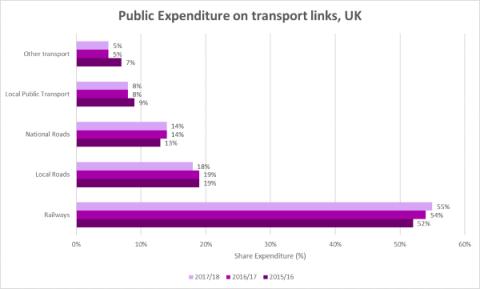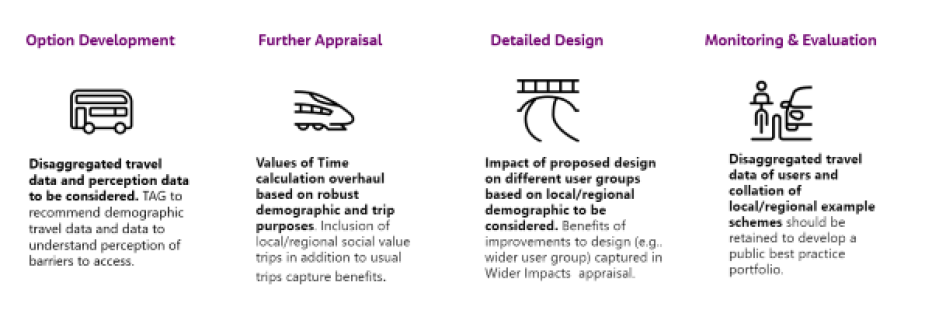
Jacobs’ Transportation Planners Sherin Francis and Katie Pearce recently won the Transport Planning Society’s Best Paper by Young Professionals at TPM 2020 for their work on reimagining transport appraisal through a more equitable lens, by taking a lifecycle approach. Here, they share their insight from the winning paper.
Transport is one of our most basic human needs. Strong transport connections that fully meet a person’s needs can aid their access to essential goods and services, and their workplace, education and wider leisure activities. Barriers limiting people’s connection to their wider community can have serious economic, health and wellbeing repercussions. The COVID-19 pandemic highlighted just how dependent key workers were on the operation of the transport network in the U.K., with a skeleton transport system running even during lockdown.
But are publicly funded transport schemes able to fulfil everyone’s needs equally? For example, are women, people from ethnic minorities, and physically disabled and LGBTQ+ people’s needs met with the current transport network?
The Equality Act 2010 requires that U.K. public transport authorities have due regard for all of the diverse communities when developing schemes. However, with women making up less than 21% of total transport workers (access the research in this link), and with most industry guidance originating many years ago when this number was even lower, it’s possible to begin to understand how the needs of these groups may be less well reflected in the transport networks we see around us.
Traditionally, transport guidance on which funding decisions are predicated tends to direct funding towards large projects that have a high ‘economic value’, where economic value is defined largely by a person’s ability to access and undertake paid work. However, these may benefit a small proportion of the population. Indeed, of all the transport schemes that are delivered across the U.K. today, the majority of funding is earmarked for big infrastructure projects.
These big infrastructure schemes and the attached funding generally tend to benefit the fraction of the population who travel long distances, over highways or more expensive rail journeys to access job opportunities further afield. Research has shown that this user group is comprised predominantly of white males from medium to high income backgrounds. Despite focusing on commuting and business trips, other trip purposes including caregiving and shopping contribute significantly to the economy, with the annual value of unpaid care provided by women in the U.K. estimated to be £77 billion ($100bn) (access the research in this link). These trip purposes are not often explicitly considered within a majority of transport appraisal and evaluation.
-

Source: Statista Research Dept. Breakdown of public expenditure (including capital spend by public corporations) on updating and maintaining public transport links in the United Kingdom from 2015 to 2018
-

Average travel patterns chart
Studies, such as those from Science Direct in this link, show that women are more likely to walk or use local public transport (like buses) and are the majority users of sustainable transport at all ages, bar 30 to 40-year-olds with higher-level household responsibilities. These gender differences in mode choice are found to be strongest in lower socio-economic areas and ethnic minorities. Recent cuts to local bus services and a lack of funding for accessible, clear footways therefore likely impacts women the most.
Despite this, user demographics are rarely considered as part of the scheme planning and appraisal processes. Existing transport policy in the U.K. does not stipulate the collection of gender (or any other protected characteristic) disaggregated data for use in transport appraisal and investment decisions. Our latest research builds the case that the lack of gender disaggregated data, combined with a workforce that lacks diverse representation, presents a heightened risk of investment decisions that are unable to reach Under-Represented Groups (URGs).
The impact of recognizing and including the travel patterns of URGs, such as women, in the appraisal process has the potential to transform how investment decisions are made; reimagining the traditional transport appraisal model and creating an agile framework able to cope with the evolving needs of twenty first century travel.
To demonstrate how this can be done in practice, we used data from the London Travel Demand Survey (LTDS), which surveys travel behaviors of London residents to understand gendered travel patterns. Analysis of this dataset accords to previous studies that transport trips, mode shares and barriers to accessibility differ between genders and ethnicities.
The data also demonstrates visible inequities in the level of service delivered and benefitted by different groups. For example, results demonstrate that although women travel shorter distances on average, they do not see an overall equivalent saving in journey times, sometimes travelling almost 20% slower on average.
This work goes beyond previous analysis of gender disaggregated travel data; considering that gender-based differences in travel are not linear across a person’s lifetime. Data suggests that transport decisions around personal safety, caregiving responsibilities and accessibility fluctuate across a person’s lifetime and that these changes differ with gender.
Key to average travel patterns chart above
- Early Ages: The gender gap in cycling begins to be seen even in the youngest age group analysed (11-15 years). This presents an opportunity for decision makers to target sustainable travel investment to address the cycling gap at an early age.
- Young Adults: Though men are more likely to report being victims of assault whilst travelling, women are more likely to report feeling afraid. It is known that sexual assault and intimidation on the transport network is vastly underreported. This can constrain travel, particularly at night or when travelling alone and is especially prevalent in younger women.
- Caregiving Ages: Women are more likely to change their travel habits to accommodate caregiving activities, often travelling encumbered, either with children, elderly people or shopping during this age. Despite unpaid caregiving contributing £77 billion to the UK economy each year trips for caregiving purposes are rarely explicitly considered in traditional transport appraisal. As women also tend to have access to a lower portion of household income, and due to the higher uptake of part-time working, they are often unable to benefit from season ticket savings.
- Older Adults: Women tend to live longer than men and are therefore more vulnerable to inaccessibility and community disconnect in old age. They are also less likely to hold a driving license, making them particularly vulnerable to local public transport cuts.
To understand how the industry could begin to accommodate these lifecycle changes, a review of existing data collection and appraisal methodologies by several U.K. transport authorities was undertaken. The review concludes that although several agencies did collect data, there was no consistent approach to deciding which data was collected or how it was analyzed. In particular, it was noted that there was a general lack of opportunity to understand gender-based barriers to travel (real or perceived) and the impact that these barriers have not only on the nature of a trip, but the degree of journey satisfaction.
Elsewhere across Europe, there are several examples of where a consistent approach is taken and has produced tangible outcomes. Most notably the ‘Gender Mainstreaming’ of Vienna and Barcelona’s ‘Gender Justice Plan’. The research reflects on the practical outcomes of these initiatives to identify transferrable outcomes for transport planners in a U.K. context.
The key outcome of the research is a series of recommendations outlining how adjustments should be made at each stage of U.K. transport infrastructure development to create more equitable outcomes. These recommendations are designed to be agile; they can be applied to any intersection of URGs and can be scaled based on project scope.
These recommendations form the basis of an additional resource for future planning frameworks to center inclusive travel in projects. By incorporating this lifetime identity-based approach, planners can provide a transport system that better meets the needs of users, whilst decision makers can assess value for money in a way that more accurately represents economic, social and environmental value.

Transport appraisal process
Refocusing the transport appraisal process so that women and other URGs can fully benefit from investment decisions ultimately increases access to opportunities and further economic return for investment. Beyond the economic benefits, these changes will help all of us on our journey to reinvent tomorrow as a brighter, more equitable world.
About the authors
Sherin Francis is a Senior Transport Planner based in Leeds, U.K. Sherin holds a B.Tech in Civil Engineering from India and MSc. Eng. in Transport Planning and Engineering (Institute for Transport Studies, University of Leeds, U.K). She specializes in transport strategy, policy creation, and business case development and assurance. Sherin has managed highway, public transport, and active mode projects with key public sector transport authorities such as Department for Transport, Transport for the North, Highways England, and other local authority bodies in the U.K. Alongside strong project delivery, Sherin is a thought-leader across inclusive transport closely working with the Transport Studies Unit, University of Oxford on further inclusive transport research. She is also a member of the global Jacobs Women’s Network leadership team and is passionate about inclusion and diversity.
Katie Pearce is a Transport Planner based in London, U.K. After completing an undergraduate degree in Physics (University of Exeter) Katie joined the industry as a Transport Modeler. She then completed a part-time MSc in Transport Planning and Engineering (University of Southampton) whilst continuing to work. During this time, she was awarded theChartered Institution of Highways & Transportation (CIHT) South West Young Professional of the Year award. Despite starting out as a modeler, Katie diversified her skillset and now sits in the Strategy & Policy team, working across all aspects of business case production. She is also a member of the global Jacobs Women’s Network team through which she has held several positions and led numerous initiatives.
Banner photo by David Marcu on Unsplash












































